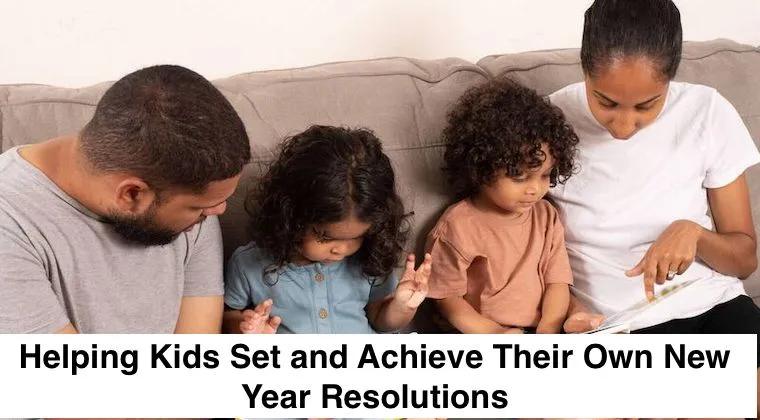+1 845 259 2974 (11 a.m to 7 p.m CST)
Helping Kids Set and Achieve Their Own New Year Resolutions

The start of a new year is a wonderful opportunity to teach children the value of setting goals. Resolutions are more than just promises; they are stepping stones toward growth, responsibility, and self-improvement. By involving kids in this process, parents can teach important life skills like accountability, perseverance, and self-discipline. The key is to make it a fun, pressure-free activity where kids feel empowered to make choices that matter to them.
Why Should Kids Have Resolutions?
Resolutions are not just for adults; they can be incredibly beneficial for children as well. When kids set goals, they learn to focus on personal growth and take responsibility for their actions. The process of setting and working toward resolutions helps them build self-confidence and develop a growth mindset.
Moreover, resolutions allow children to identify areas they’d like to improve, such as organizing their belongings or being kinder to others. These small but meaningful goals can have a lasting impact on their development and help them better navigate challenges as they grow.
Choosing Age-Appropriate Resolutions
Setting the right goals is essential to keep kids motivated and on track. Age-appropriate resolutions ensure that children don’t feel overwhelmed or discouraged. Younger kids might benefit from simpler goals that focus on everyday habits, while older kids can handle more complex resolutions that challenge their abilities and encourage growth.
For instance, younger kids can focus on goals like tidying up their toys, brushing their teeth regularly, or being polite to others. Older kids, on the other hand, can aim for more structured goals, such as improving their study habits, learning a new skill, or saving money. The key is to tailor the goals to your child’s age, interests, and abilities.
How to Help Kids Set Resolutions
Setting resolutions can be an exciting activity if approached the right way. Kids often need guidance to define their goals, and parents can play an active role in helping them identify what they want to achieve.
Start by brainstorming together. Sit down as a family and discuss what they would like to improve or explore in the new year. Encourage them to reflect on their strengths and areas for growth. Prioritize their interests to make the process enjoyable and meaningful. Break larger goals into smaller, manageable steps to avoid overwhelming them. Finally, write the resolutions down, perhaps in a colorful chart or journal, to keep them visible and motivational.
Tips to Help Kids Achieve Resolutions
Setting resolutions is only half the battle; achieving them requires effort, encouragement, and consistency. Parents can make the process smoother by offering regular support and celebrating small successes along the way.
Acknowledging even minor progress can boost a child’s confidence and motivation. Being a role model is equally important—share your resolutions and work on them alongside your child to inspire them. Regular check-ins are another effective way to monitor progress and discuss challenges. Most importantly, avoid punishing kids if they fall short; instead, focus on encouraging effort and persistence.
Fun Ways to Stay on Track
Keeping the process enjoyable is key to maintaining your child’s enthusiasm for their goals. Turning resolutions into a fun activity makes it easier for kids to stay committed.
For example, you can create a resolution chart with stickers or stars to mark achievements. Use apps or journals to track their progress visually. Consider implementing a family reward system, where everyone gets to celebrate when individual or collective goals are met. These strategies make the process less about pressure and more about enjoyment and teamwork.
What to Do When Kids Struggle with Resolutions
It’s normal for kids to encounter difficulties while working on their resolutions. The important thing is to approach these challenges with patience and positivity.
If your child struggles, offer support and guidance without being critical. Help them adjust their goals to make them more attainable, or break them into smaller steps. Reinforce the idea that mistakes and setbacks are part of the learning process. By focusing on the effort rather than the outcome, you can help your child develop resilience and perseverance.
Examples of Simple Resolutions for Kids
If your child is unsure about what goals to set, you can offer some ideas to inspire them. Here are a few examples:
- Be kind and say “please” and “thank you” more often.
- Try one new food every week to expand their palate.
- Limit screen time to a specific number of hours daily.
- Help with household chores, such as setting the dinner table or watering plants.
- Read one book every month to build a reading habit.
These resolutions are simple, achievable, and aligned with the everyday lives of kids.
The Role of Parents in the Process
Parents play a significant role in helping kids set and stick to their resolutions. Your support and encouragement can make all the difference in turning this activity into a positive experience.
Be actively involved by guiding them in setting realistic goals. Share your own progress with your resolutions to inspire them and make the activity a family tradition. Celebrate their achievements, no matter how small, and encourage them to keep going. By showing them that resolutions are about growth and not perfection, you can foster a healthy attitude toward goal-setting.
Helping kids set and achieve their resolutions is an excellent way to teach them essential life skills like goal-setting, perseverance, and self-discipline. It’s not just about ticking off tasks; it’s about building habits and fostering a mindset that values growth and effort.
As the year progresses, encourage your kids to reflect on their achievements, celebrate their successes, and learn from their efforts. By making resolutions a fun and meaningful tradition, you’re giving your kids the tools they need to thrive—not just in the new year, but for years to come.





















